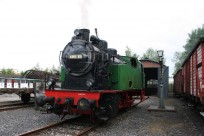The steam locomotive “Anna No. 6” was built in 1940 in the Friedrich Krupp factories in Essen. Up until World War II it transported freight for the ammunition factory “Friedland” in Hessen.
Between 1959 and 1986 it was used as a shunting and mainline-locomotive by the Ruhr mining industry as well as the pit “Anna” (which gave it its name), which is at the colliery “ Alsdorf” in the Aachen area.Today the locomotive is used for rides at the LWL-Industrial Museum “Zeche Zollern”.
The sounds of “Anna No. 6” were recorded during a ride through “Zeche Zollern”. What you hear is the sound of the locomotive rolling over the track, the typical puffing sound as steam is blown through the stack and the hissing of the air-pump, which produces pressure for the brakes.
These sounds are mostly due to the steam engine. In order to work it needs coal, fire and water.
The coal is shovelled out of the coal box behind the driver's cabin, into a fire box where it is burned. Hot air is created, which flows through pipes to a boiler full of water. The hot pipes in the boiler heat the water up until it starts to boil. Steam is generated and guided to a cylinder. The steam flows in and creates so much pressure, that the rods connected to the driving wheels of the locomotive start to push back and forth, which moves the steam train. This is how the locomotive makes its rhythmic sounds. The engine's huffing is the sound of the smoke and exhaust gas being emitted through the stack. The hissing sound of the air pump is created when steam is used to lower or raise the air pressure for the brakes.
In the 19th century the typical sounds made by a steam engine were sounds associated with progress. Today they are often (nostalgically) perceived as sounds of past times and outdated technology.
Sound recordist: Konrad Gutkowski
Photographer: Konrad Gutkowski



 ARTIKLAR I WIKIPEDIA
ARTIKLAR I WIKIPEDIA ARTIKLAR I WIKIDATA
ARTIKLAR I WIKIDATA BILDER I WIKIMEDIA COMMONS
BILDER I WIKIMEDIA COMMONS


